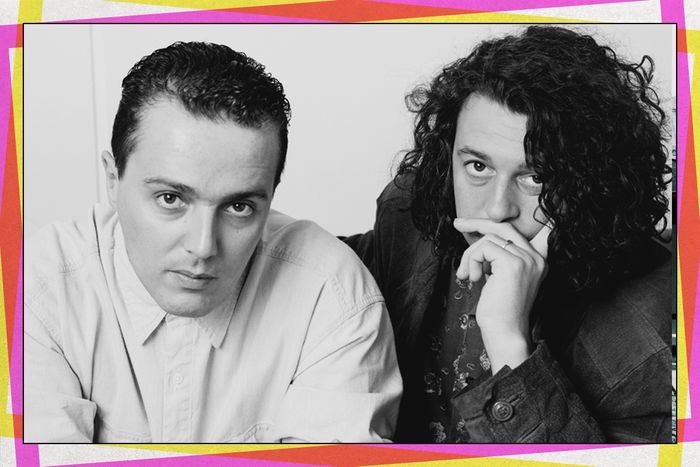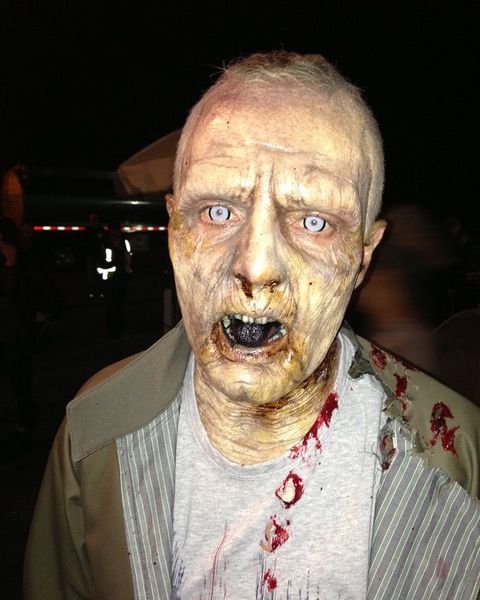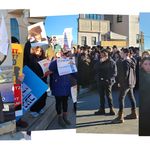
Strip away the catchy-as-hell synths and power chords, and Tears for Fears’ music is pretty much the sonic equivalent of a therapy session. As part of the “second British invasion” that arrived on the U.S.’s airwaves in the ’80s, front men Curt Smith and Roland Orzabal were a little deeper — a little smarter — than their equally well-coiffed contemporaries that had “minds” or “twins” in their names, offering up a triple punch of a primal platter with 1983’s The Hurting, 1985’s Songs From the Big Chair, and 1989’s The Seeds of Love. (Not that we can make the official decision, but “Everybody Wants to Rule the World” is, for all intents and purposes, the theme song for 1985.) They were crooning about neurosis, depression, and political protest, but they did it in an accessible way for the MTV generation.
Following a bitter creative separation in the ’90s, during which time Orzabal released two Tears for Fears albums without Smith, the duo reconciled in the early aughts and are now releasing their newest album in 18 years, The Tipping Point, on February 25. It throttles everything from the pandemic to the patriarchy, as well as some brutal “tipping points” that have plagued Smith and Orzabal themselves in recent years — not that Smith would want it any other way. Calling from his “small den in Los Angeles,” Smith cheerfully reflected on the band’s highs and lows, his greatest lesson of friendship with Orzabal, and becoming a small-screen icon thanks to Psych. “I’ll leave it to you to lead the way,” he offered.
Best song
I won’t include the new album purely because it’s new to us; in that sense, we’d be biased to the new work. I would say “Sowing the Seeds of Love” is the best. That’s not just because of the song, either. The thing about being a recording artist is the strength of your recordings is what matters to you. The production of this, I think, is the best piece of work we’ve done as far as a single or one track goes. It’s as close as we’ve ever got to perfection on production. We were allowed to go full throttle into getting an entire orchestra into a room. When you listen to the song, it’s clearly a Beatles pastiche — we’ve not been shy about that. We really wanted to have a full orchestra and make it big with a ton of strings. There’s an oboe solo. When we were growing up, we were influenced by the Beatles and George Martin’s string arrangements. It was just a joy to make. We were lucky that we had the luxury to be able to do something like that, because we were big enough at that point in time to afford to bring in a whole orchestra. Those are the things that bring you immense joy.
I think “Mad World” is our best, lyrically, because it’s so direct. It doesn’t fight against the production; it’s a contrast. We produced it as an uptempo song with very dark lyrics. In a sense, the Michael Andrews and Gary Jules version is far more in tune with the lyrics. But “Mad World” is very clean and never gets dated.
Song you regret recording
There are songs that I don’t like or I’d rerecord, but I wouldn’t say I regret any of them, because they tend to lead you somewhere. If there was one I really didn’t like and can’t bear to listen to, it would be a single that was released between The Hurting and Songs From the Big Chair called “The Way You Are.” Most people don’t know about it, thankfully. It really is not very good, but it did lead us into doing Songs From the Big Chair. The problem with The Hurting was it was quite insular and inward-looking, which was how it was supposed to be at the time. We were starting to get a little older and be more outward-looking and a little more political. “The Way You Are” was that step where we went down the rabbit hole of the intricate and clever production, but forgot about the song. We corrected that by the time we started recording Songs From the Big Chair.
I would rerecord “Mothers Talk.” But having said that, we’ve tried three or four different recordings of that song and it’s still not right. Maybe it’s one of those things that will never be right. It’s the feel of it. “Mothers Talk” is this weird song that’s somewhere between a shared bombasity but is very electronic. We haven’t, and didn’t, strike that balance particularly well. We were still torn between the electronic side of it and making it bigger. The rest of Songs From the Big Chair is bigger and bolder than “Mothers Talk.” It never gets to that point where it’s convincing to me. A lot of this is always a feeling, it’s not something you can actually put into words. It just doesn’t do it for me. No version yet has done it for me.
Song that should’ve been longer
None of them. The songs that are longer are definitive versions. Where I question it is when they’re edited down, because they’re intended to be long. They normally don’t have the same impact when they’re shortened. We even wrote a line in one of our songs about that problem. “Shout” was the first single to come out from us that was six minutes long. We had an argument while we were trying to edit it while we were still finishing Songs From the Big Chair. Our A&R man at the time came in and was adamant that we chop five seconds off the end because it will make the difference between it being a hit and not a hit. Of course that was utter nonsense, especially on a fade, because if a radio station wanted to, they could just fade it themselves at the end. So in “Everybody Wants to Rule the World,” there’s a line that goes, “So glad we almost made it / So sad they had to fade it.” That came from that problem of being asked to fade the end of “Shout” by five seconds. We’re big Pink Floyd fans, so the joy of recording is being able to make an album that’s a journey, but sometimes that journey is within the song. It becomes a journey in and of itself, and those are the most fun ones to make.
Most existential song
It’s interesting, because sometimes you can get into a mood that creates something you then consider to be the song with the most feeling, and it’s more about the mood you’ve created from a musical standpoint. As far as lyrically, I’d go back to “Mad World.” But I generally go for the deeper album tracks. “Ideas As Opiates” is pretty existential. The title itself tells you that it’s a little deeper than the average song. I think “The Working Hour” is a track that really … well, there are certain tracks that are pivotal to albums, and make albums something more than just a collection of hit singles and a bunch of other tracks. Instead, they can actually give you the feel of the album. “The Working Hour” does that on Songs From the Big Chair.
Most philosophy-influenced song
It changes as you get older. Philosophically, there was a theme throughout The Hurting that was very prevalent. We were highly influenced by the work of Arthur Janov at that time, so a lot of that album was dealing with childhood trauma. Philosophically, I guess it’s interesting that we were 20-year-olds when we finished The Hurting. It was written during our late teens and we were trying to mine our childhood trauma. Laying the blame on our parents’ door and all that kind of stuff that teens tend to do. We had become far more philosophically outward-looking and were discussing the politics in England. But as opposed to being angry about it, it became the joyous “Sowing the Seeds of Love.” This is the way we get out of this — to come together. We get more world-wise as we get older.
I found it disturbing that some fans didn’t understand that. There is a depth to the lyrics and there is a depth to what we do and it means a lot to us. When we went out on The Hurting and Songs From The Big Chair tours, certainly in America, there were girls screaming at us. I actually had my shirt ripped off me in Canada — these kinds of things where you’re like, You don’t know me, why would you have that reaction? In the end, it’s strange because as late teens with The Hurting, we were desperate to be understood, yet most of the time in music you are misunderstood. There’s a strange dichotomy there, where you’re clearly writing it because you need to say these things, and when people don’t get it or don’t understand it, it’s sort of weird. When you become a huge successful band, people tend to think that you are rich and fine and you don’t care about the average person, which couldn’t be further from the truth. Neither of us are very comfortable being pop stars at all. I would say we are really bad at it. I think somewhere in there may lie the reason why it takes us so long to make records, because the idea of going back into the public eye is strange to us.
I think that’s also the reason why I ended up moving to New York. The city pulled me to it because it was the one place I could go where no one paid any attention. No one cares who you are. No one stops you in the street. They can know who you are, they’ll recognize you, but they will not stop you. I lived there for a decade and I go back regularly, and more regularly now because my daughter’s in college there. I have been stopped on the street twice in 30 years. That’s the joy of New York. That’s my kind of comfort zone. It’s weird because, being a musician, you would think we crave attention. Yet when you get the attention, you’re like, I’m not really enjoying this that much.
I sometimes get into these brief discussions on Twitter when I talk about politics. My biggest bugbear is people who respond along the lines of, “Stick to music, don’t talk about politics.” Have you not listened to any of our songs? [Laughs.] Do you not understand that half of our songs are political? I find that fascinating.
Worst needle drop or cover
Bad covers to me are always people who attempt to do it the same way as you. I’m a big Patti Smith fan, for instance, but her version of “Everybody Wants to Rule the World” didn’t move me at all because it was just like the original. People who cover it and don’t attempt to change it is where I have the issue. You should put your own interpretation on it. The bad ones to me and the most annoying ones are the elevator versions — the music versions that sometimes I hear when I’m somewhere in a hotel. They’re bad, elevated, and muted versions of songs. I find those upsetting because I think, Oh my God, that’s what we’ve become.
Most therapeutic album for you to record
This new one. Without a question, we’ve gone through so much to try and get this finished, and we’ve come out at the end closer. Normally the opposite happens, because we’ve been going through the wringer and trying to get this album finished. It can be a real struggle, and that struggle tends to linger. We had a bunch of years that were not good trying to make The Tipping Point. Recording the last five tracks, and redoing the five we already had to make them in line with those five tracks, was the most enjoyable and most therapeutic moment in our history together. To end up in a far better place than we were when we began it, in that sense, has been therapeutic.
Favorite Curt Smith–less Tears for Fears song
I don’t know them well. It was during a time where I was trying to not be a part of that, so I didn’t listen to those songs much. I have come to really like “Break It Down Again.” We play that song nowadays and I enjoy playing it. I get a real kick out of “Fish Out of Water,” which is about me in a very derogatory way. I found it highly amusing. I would pick those two songs.
Weirdest place you heard ‘Everybody Wants to Rule the World’
There’s been a bunch of weird places. It normally involves doing something mundane, like standing in line somewhere and suddenly it comes on and you’re like, Oh my God. But the weirdest one, and it was really more to do with the timing of it all, was the day Live Aid was happening, and we didn’t do Live Aid. We decided not to. We were in Hawaii and it was the one break we had in a long and grueling touring year. We had four or five days off and I’m walking down the street in a little town in Maui, and I can hear a bar band playing “Everybody Wants to Rule the World.” That was the most surreal. I’m listening to a bar band play one of our songs when we should be on stage in front of 100,000 people. I did not go in and join in.
I have done a karaoke version of that song and no one paid the blindest bit of attention to me. That was a moment with the people from Psych. The actors are very much into karaoke. We all went to a karaoke bar in Vancouver and they said I should get up and sing, so I actually got up and sang “Everybody Wants to Rule the World” and no one else in the bar paid any attention. They were too busy picking out what they were going to do, right? It was totally funny.
Song whose meaning has changed the most for you
I have to go back to “Mad World,” purely because it’s now become a much calmer view of the world to me and I had a very intense view of the world at the time. I think I’ve come full circle on it because of the other versions. And I think the reason that playing it with my daughter seemed to connect with people, and that it became this little viral thing, was because we were all locked down with our families. Your view of the world undoubtedly changes when you become a parent, and for me to be the angst-ridden teen boy singing it to then be the father singing it with my angst-ridden teen daughter was full circle. I think it then took on a whole new meaning. Seeing her get into it and clearly understand it was quite moving to me. The meaning behind the songs can always change depending on your viewpoint. I think “Shout” is harder for me to do nowadays, because that song was very much us wanting to shout. I don’t necessarily want to do that anymore. Now I have to look at it as encouraging other people to shout, preferably people younger than me. In that sense, I’ve got to change my view of the song to really be honest about it.
Most meaningful aspect of Rock Hall of Fame eligibility
We’re getting older, so we’re now the elder statesman of music. With that comes a certain level of respect if you’re still alive and playing. In that sense, it seems quite natural to me, so I do like the fact that suddenly we’re being appreciated. We’re appreciated more now than we were ten years ago without question. I was discussing this with Roland recently — there’s a certain respect with interviewers that wasn’t there before. We’ve both noticed it this time around. I hope some of that is to do with the strength of this album, but I think a lot of it is to do with us managing to last this long. Do I care about being nominated for the Rock and Roll Hall of Fame? I guess it would be nice. That kind of legacy is more for my kids than anything else. I don’t think it is for me. But it does do something; I can’t say it doesn’t stroke your ego to a certain degree to have a standing ovation from people in the industry. That’s the gratifying side of it. In that sense, when you’re talking about an industry award or recognition, it’s slightly more meaningful to you as musicians to know that you are respected by your peers.
Greatest lesson from four decades of friendship with Roland
The biggest lesson — which is hard for us, because we’re very strong-willed people, hence two front men — is that we can’t do without each other. It’s hard for both of us to admit that, but it’s something we have come to learn. We’re better together than apart, and there’s some magic that happens when we’re together. But it took us both a really long time to come to terms with that, hence the breakup and hence me walking away from it. Being able to admit that you need someone else is actually a very valuable lesson for people who are as single-minded as we are.
Defining Psych guest-star moment
How it came together was James Roday attended a show of ours in Los Angeles, and he was friends with one of the parents from our school, so he managed to get backstage with my guest list. I had never seen Psych, and he was like, “You have to come on our show.” He was a little intense and I didn’t think much of it at the time. But he followed up with my management and I watched a few episodes and thought the show was highly amusing. James wouldn’t let go; he kept asking, so I finally said sure. The cast is exactly how you think they are. It’s like they’re all 10-year-olds when on set together and it’s a joy to be around. When they asked me back again, of course I said yes.
The show’s creator Steve Franks and James wrote the scripts and were basically trying to find ways to abuse me in some shape or form. You can probably tell how much of the envelope they can push and I’d still say, “Okay, I’ll do it.” I think the “100 Clues” episode was very funny. Being mauled by a panther and shot, you thought they couldn’t get lower than that. But yeah, of course they could find a way. “Nightmare on State Street” would have to be my favorite moment. The shot of me as a zombie is pretty intense. I had to have my face completely molded and done in Los Angeles before going up to Vancouver to film. It was a big and intense three hours of makeup. The whole premise with me forced me to be as self-deprecating as I possibly can. I’m into that and I’m fine with it. I’m sure there are some lines I wouldn’t cross, but I haven’t got to them yet.
More From The Superlative Series
- Lenny Kravitz on the Most Rejuvenating and Indulgent Music of His Career
- Mark Knopfler on the Most Patient and Wistful Music of His Career
- The Best and Cringiest of Creed, According to Scott Stapp
With all your high-class friends you think you’ve got it made /
The only thing you made was that tanned look on your face.” The band has previously discussed how Live Aid organizer Bob Geldof announced that they were performing at the event without their knowledge. They were extensively touring for Songs From the Big Chair at the time. Smith and his daughter Diva’s “Mad World” cover from April 2020 has over 7 million views. Tears for Fears has been eligible for Rock Hall induction since 2007. They have never received a nomination. Shawn Spencer, a.k.a. Shawn Spence-Star, a.k.a. a “big fluttery fangirl” when it comes to Tears for Fears. Smith appears as a fictionalized version of himself in three Psych episodes as well as Psych 3: This Is Gus. In the film, he’s down on his luck and pursuing a role in Andrew Ridgeley’s newly reformed Wham! That seems like a legal minefield, you may be thinking. “He’s taking the H and exclamation point out of Wham! It’s a totally different band name,” Smith’s character explains. “Tastefully understated.”






